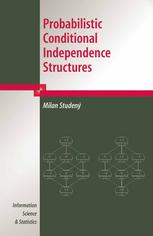

Most ebook files are in PDF format, so you can easily read them using various software such as Foxit Reader or directly on the Google Chrome browser.
Some ebook files are released by publishers in other formats such as .awz, .mobi, .epub, .fb2, etc. You may need to install specific software to read these formats on mobile/PC, such as Calibre.
Please read the tutorial at this link: https://ebookbell.com/faq
We offer FREE conversion to the popular formats you request; however, this may take some time. Therefore, right after payment, please email us, and we will try to provide the service as quickly as possible.
For some exceptional file formats or broken links (if any), please refrain from opening any disputes. Instead, email us first, and we will try to assist within a maximum of 6 hours.
EbookBell Team

5.0
28 reviewsConditional independence is a topic that lies between statistics and artificial intelligence. Probabilistic Conditional Independence Structures provides the mathematical description of probabilistic conditional independence structures; the author uses non-graphical methods of their description, and takes an algebraic approach.
The monograph presents the methods of structural imsets and supermodular functions, and deals with independence implication and equivalence of structural imsets. Motivation, mathematical foundations and areas of application are included, and a rough overview of graphical methods is also given. In particular, the author has been careful to use suitable terminology, and presents the work so that it will be understood by both statisticians, and by researchers in artificial intelligence. The necessary elementary mathematical notions are recalled in an appendix.
Probabilistic Conditional Independence Structures will be a valuable new addition to the literature, and will interest applied mathematicians, statisticians, informaticians, computer scientists and probabilists with an interest in artificial intelligence. The book may also interest pure mathematicians as open problems are included.
Milan Studený is a senior research worker at the Academy of Sciences of the Czech Republic.